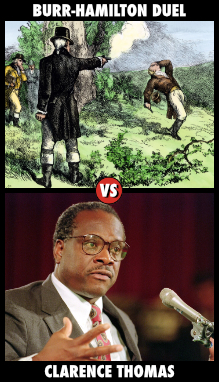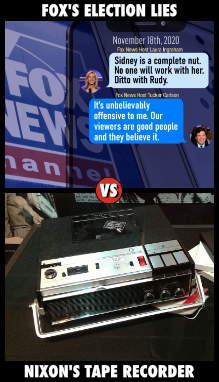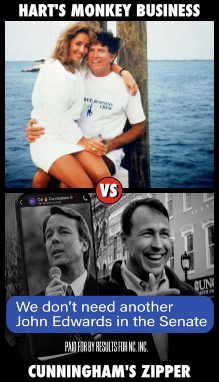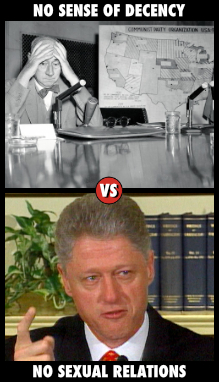

Today, we move to a different quadrant of the overall bracket. In the actual NCAA Tournament, the quadrants are known as "regions," because where the games are played (and, to some extent, where teams are placed) is dictated by geography. In the case of the blunders competition, there's no geographic component, so "region" doesn't really make sense. Hence "quadrant."
The Venality quadrant involves situations that were fundamentally unethical, illegal or immoral. Each of the various entrants involves a political figure trying to pull a fast one of one sort or another, but getting caught with their hands in the cookie jar.
Also, as a reminder for those who don't follow sports, the actual NCAA Tournament begins with four games called the "First Four"; these pit, in effect, the eight weakest teams in the tournament against each other for entry into the main bracket. This was done to increase the number of participants (and, not coincidentally, the amount of money the tournament brings in). In order to remain true to our inspiration, we also staged a First Four of the two weakest entrants in each bracket. This was announced last week.
And with that out of the way:
VENALITY BRACKET FIRST FOUR RESULT
George H.W. Bush Nominates Clarence Thomas to the Supreme Court (79.5%) defeats George W. Bush Fires Seven U.S. Attorneys (20.5%)
Some reader comments on this matchup:
- J.L. in Glastonbury, CT: I went with Clarence Thomas because we've been reminded of Bush 41's blunder regularly for 30 years; firing the U.S. Attorneys was just one more brick destroyed in the wall of norms, paling in significance to politicizing a fraudulently sold war and what was to come from Donald Trump...
- P.M.C. in Schaumburg, IL: The Republicans got exactly what they wanted in Clarence Thomas; he is the gift that just keeps giving. To be a blunder it must have some negative connotations. Even after going through all those word things, I can't see how this was a blunder.
- D.L. in Uslar, Germany: I'm not sure Clarence Thomas can be considered a blunder. Sure, his rulings have been bad for the country (in my eyes and those of many liberals, at least), but any other Bush appointee would have been little different. Withdrawing his nomination would probably have been as bad a blunder as sticking with him. Thomas counts less as a blunder and more as playing a very weak hand.
- M.K. in Long Branch, NJ: If these are the 16/17 seeds, the competition in this bracket must be tough indeed. Thomas is the clear choice, as Bush nominated a clearly unqualified candidate, the Senate failed in its duty to weed him out, and his performance speaks for itself.
- A.T. in Quincy, IL: As you noted, the attorneys weren't fired until after G.W. Bush had won re-election, so in a sense, it was actually rather shrewd to wait, especially for a President of W's caliper (sic). At the same time, it's hard to say what consequences have resulted from their dismissal. I can't think of any, for sure. The selection of Thomas, on the other hand, was a blunder (if a blunder it was) whose consequences remain with us to this very day, and potentially well into the future.
VENALITY ROUND 1, PART I, MATCHUPS

#1 Alexander Hamilton Duels with Aaron Burr (July 11, 1804): If you think Donald Trump and Hillary Clinton, or Donald Trump and Ron DeSantis, or Donald Trump and Joe Biden, or Donald Trump and Nancy Pelosi, or Donald Trump and pretty much anyone represent the height of political animosity in American history, then you don't know about Alexander Hamilton and Aaron Burr.
The rivalry between the men had many causes. Hamilton was a Federalist, Burr a Democratic-Republican. Both wanted to control politics in their home state of New York. Hamilton thought Burr a conniving schemer with little love for the Constitution, Burr thought Hamilton a shady operator whose primary concern was the well-being of the economic elite. Neither of them was necessarily wrong in their assessments. Both were also masters of passive aggression, and managed to push each other's buttons for years and years in a manner that allowed them to avoid taking responsibility for their actions.
Things finally reached their boiling point in 1804. Hamilton was not in the best emotional state, in part due to financial problems and in part due to his son's having died... in a duel. Meanwhile, Burr's career was in deep trouble; he was dumped as VP, and was running for governor of New York. A loss in that election would be (and, in fact, was) the end of the line for Burr as politician. It was in that context that the usually cunning Hamilton arranged for the publication of a staunchly anti-Burr letter written by Hamilton's father-in-law. It described Burr as a "dangerous man, and one who ought not be trusted with the reins of government." It also made specific reference to even less flattering opinions that Hamilton himself had about Burr, without spelling out exactly what those opinions were.
The pi**ing contest that ensued was long and complicated and would make a pretty good opera. Or maybe a musical. Someone should really look into that. The bottom line is that it was obvious that Hamilton was behind the attack on Burr, Burr wanted an apology, and Hamilton refused to give one. Eventually Burr challenged Hamilton to a duel. This is where the venality comes in (assuming that a bunch of nasty personal attacks does not qualify as venal), as dueling was illegal by that time. Hamilton and Burr both knew it, and so they took extensive steps to avoid legal trouble for themselves or their seconds (for example, crossing over the state line into a fairly remote part of New Jersey).
Hamilton did not want to duel, and he definitely did not want to kill Burr, but he also did not want to be dishonored. There is some evidence that he intended to spoil his shot, which would have satisfied the needs of honor without doing any actual harm. Burr did not feel the same way; he aimed to kill and hit Hamilton in the gut. After a couple of agonizing days, Hamilton expired. Not only did his blunder cost him his life, it also deprived the Federalist Party of its most effective organizer. It's not a coincidence that the Party was effectively dead in little more than a decade.
#16 George H.W. Bush Nominates Clarence Thomas to the Supreme Court (July 1, 1991): We've already discussed this one, in the inaugural post in this series. As you can see above, quite a few readers are not persuaded this really constitutes a blunder, either because it worked out very well for the Republican Party or because George H. W. Bush had limited options given that he needed a Black, conservative jurist. Fair enough; we included it because we believe Bush 41 really did value democracy, and that he would be distressed by some of the things Thomas has done in the last year or two. We can't know for sure, of course, because Bush Sr. died in 2018.

#8 Fox Lies about Voter Fraud (Nov. 8, 2020): Throughout the 2020 campaign, Fox was happy to indulge Donald Trump and his inside circle as they made all manner of claims about the potential legitimacy of the outcome. Mail-in balloting was a particular obsession, though there was carping about many other matters, too. It's almost like Team Trump knew they were going to lose and were proactively trying to protect Trump's ego and/or to set the stage for insurrection.
Still, whining about mail-in balloting isn't actionable. Fox didn't cross the line into "potentially illegal" until the Sunday following the 2020 election. On that day, Trump ally and all-around loon Sidney Powell appeared on the show Sunday Morning Futures, hosted by Maria Bartiromo. The host asked: "Sidney, we talked about the Dominion software. I know that there were voting irregularities. Tell me about that." And Powell replied: "That's putting it mildly... That is where the fraud took place, where they were flipping votes in the computer system or adding votes that did not exist... That's when they had to stop the vote count and go in and replace votes for Biden and take away Trump votes."
Other Fox personalities took it from there, with both Sean Hannity and Tucker Carlson picking up the banner the very next day. But Bartiromo's show is where it started, and so it's not surprising that this exchange appears at the very beginning of the lawsuit that Dominion filed against Fox (it also shows up in Smartmatic's lawsuit).
There are some blunders in this competition whose consequences are not yet known, and may not be known for years. All that can be done is to guess what the consequences might be. If Fox loses the suit, they're going to take a huge financial hit. And it's at least possible their business, or at least their business model, can't survive that blow.
#9 Richard Nixon Decides to Install a Taping System in the White House (February 1971): Richard Nixon was persuaded that his presidency would be historic (he was right about that, though not in the way he had hoped). And he knew that Lyndon B. Johnson, who was also deeply impressed with himself, had arranged to record all of the conversations that took place in key spots in the White House (e.g., the Oval Office). So, a litte more than halfway through his first term, Nixon decided that he wanted a recording system, too (this was after trying other alternatives, and finding that none of them produced accurate accountings of his conversations).
The scheme started small, at first, with only the Oval Office and the White House Cabinet Room being recorded. Eventually, it expanded to several more White House rooms, to Camp David, and to several different important phone lines. Under those circumstances, it was easy to forget that everything was being captured for posterity. And so, Nixon was sometimes caught on tape swearing. Or saying things that were racist or sexist or antisemitic. Or, you know, ordering the FBI to cover up the crimes of campaign staffers who had broken into Watergate.
At this point, let us note that Nixon's actual order to engage in a cover-up did not make the bracket, and isn't going to show up when we reveal the other eight Venality contenders tomorrow. We made that decision because ordering the coverup wasn't really a mistake, it was a gross act of immorality and illegality that Nixon tried to get away with and failed. Installing the tape system was also rooted in venality (specifically, arrogance), but was much more of a blunder, as it had profound consequences that Nixon simply didn't foresee. It's also worth noting that without the tapes, Nixon would probably have survived the Watergate scandal. After all, the fight over whether Congress could listen to the "smoking gun," followed by the ham-fisted erasure of the key recording, is what turned the public against Nixon. And the release of an alternate smoking gun tape, from a different day, is what finished the job and forced his resignation.

#4 Gary Hart Invites the Press to Follow Him Around (May 3, 1987): As we noted in the introductory post, we tried to keep the number of sex scandals to a manageable number. It is just a coincidence that we ended up with a sex scandal vs. sex scandal matchup in the first round.
Gary Hart made the cut because of his brazenness, and also because his shenanigans effectively marked a brave, new world in political reporting (muckraking?). Before the 1980s, politicians cheated on their spouses left, right and sideways, and the press uttered nary a peep. Go look for the contemporary coverage of the dalliances of John F. Kennedy or Lyndon B. Johnson. You won't find it.
Maybe it was Richard Nixon's fault. While he didn't cheat on his wife, he engaged in pretty much every other form of unethical behavior, taking some of the luster off the "imperial presidency" while teaching the media that scandal sells. The change might also have to do with the evolving media landscape; whereas newspapers and the evening news had been dominant for generations, by the 1980s those media were getting competition from talk radio, cable TV, scandal-driven newsmagazines and the earliest incarnations of the World Wide Web. So, salacious content may have been a necessary step in order to keep watchers watching and subscribers subscribing.
In any case, Gary Hart failed to read the tea leaves and to understand that he no longer lived in a world where Nelson Rockefeller could die of a heart attack while shtupping his secretary and have it reported that he was giving dictation. And so, while running for president in 1987—arguably as the Democratic frontrunner—Hart carried on an extramarital affair with a woman named Donna Rice. Reporters from The Miami Herald managed to figure out what was going on, and they challenged the candidate on his dalliances. Hart's response: "Follow me around. I don't care. I'm serious. If anybody wants to put a tail on me, go ahead. They'll be very bored."
Hart would later say that he did not expect the reporters to actually take him up on the offer, which was a pretty bad guess, because of course they did accept the offer to follow him around. And they managed to confirm what was already suspected, namely that Hart was cheating on his wife. It was particularly delicious that the Herald staff got photos of Hart and Rice fooling around on a yacht named Monkey Business.
At the time, public opinion was divided. Some were bothered by Hart's behavior. Others felt the press had been inappropriately intrusive. Still others took the position that boys will be boys and that, as New York governor Mario Cuomo observed, "everyone has some skeletons in the closet." Still, Hart's polling numbers took a dive, and on May 8, 1987, he suspended his campaign, ending his presidential hopes less than a week after his taunt.
#13 Cal Cunningham Gets Caught Cheating on His Wife (October 6, 2020): Incumbents usually have the advantage in Senate contests. But not so much in North Carolina, where one-term senators are more the norm than the exception. So, Sen. Thom Tillis (R-NC) was no shoo-in to keep his job in 2020 and, indeed, he trailed Democratic challenger Cal Cunningham in polls for most of the campaign.
But then came a literal October surprise, as a woman named Arlene Guzman Todd revealed that she and Cunningham had been "intimate" in July of that year. There were extensive text messages to back her claims up, and so the candidate had little choice but to acknowledge that she was telling the truth. He also refused to answer questions about other potential dalliances, which certainly left the impression that Guzman Todd was not the only one. North Carolina is a Southern state, which means a lot of voters who dislike sexual shenanigans (unless, apparently, they are the work of Donald Trump). Cunningham fell behind Tillis in the polls, and ultimately lost the election, 48.7% to 47%.
So why did this sex scandal, among the many available options, make the cut? Because if Cunningham had kept his zipper in the upright position, and had won the election, the Democrats would have needed either Sen. Joe Manchin (D-WV) OR Sen. Kyrsten Sinema (I-AZ) during the time they had the trifecta as opposed to needing both Manchin AND Sinema. How might things be different if that were the case?

#5 Joseph McCarthy Meets His Match in Joseph Welch (June 9, 1954): As with the Watergate coverup (see above), we do not believe that then-senator Joseph McCarthy's crusade against alleged American communists (and, at the same time, against alleged American homosexuals) was en error. It was a calculated, grossly immoral choice made in the vulgar pursuit of power and fame.
And for several years, it worked. A reasonable case could be made that from 1950 to 1954, McCarthy was the second most powerful person in the country, behind only the president. And actually, since the first half of that covers the latter portion of Harry S. Truman's term, and Truman was wildly unpopular, it might be the case that McCarthy spent some time as the most powerful person in the land. Certainly, he was powerful enough that Dwight D. Eisenhower, despite having won the largest war in human history and being a very popular president, was leery of a direct confrontation. For those keeping score at home, that means that Ike had no problem going mano-a-mano with Adolf Hitler or Benito Mussolini, but was not willing to take on Joe McCarthy.
Over time, McCarthy got way too big for his britches. He eventually arranged for his hearings to be aired on the then-new medium of television. Apparently, the Senator did not realize that his greasy hair and nasally voice were a turnoff that brought to mind a very large rat. Then, he started pointing fingers at members of the U.S. Army. It was one thing when McCarthy was going after artists, labor leaders, civil rights leaders, college professors and other groups that skewed overwhelmingly liberal. But going after the mostly conservative military? That was much more problematic. And the Army responded by hiring, as its lead counsel, Joseph Welch. Welch was a brilliant lawyer, one whose shark-like skills surely made Johnnie Cochran jealous. However, he was also elderly, soft-voiced, and wore a bow tie. The overall visual impression was "grandpa." And the contrast with McCarthy could not have been more striking.
Thus was the stage set for the fatal blunder. McCarthy was in the habit of going after people much weaker than he, people who could not defend themselves, in the process destroying their lives and their careers. And so he targeted a young but promising member of Welch's law firm, who had briefly participated in a few groups in college that were vaguely left-leaning. The implication is that the young lawyer was probably a communist, and that maybe Welch himself was also a communist.
Welch had been waiting for this. Although his remarks appeared to be spontaneous, they were actually penned in advance: "Until this moment, Senator, I think I never really gauged your cruelty or your recklessness. Let us not assassinate this lad further, senator. You have done enough. Have you no sense of decency?"
The house of cards largely collapsed from there. McCarthy's credibility was shot, his hearings came to an end, and he was censured by his Senate colleagues. Depressed by his loss of power and popularity, he leaned heavily into the bottle. He already had a drinking problem, and this was the final blow to his alcohol-battered body; less than 3 years after Welch unloaded, McCarthy was dead. Most sources say cirrhosis was the cause of death; some say it was a de facto suicide.
#12 Bill Clinton: "I Did Not Have Sexual Relations with that Woman" (Jan. 28, 1998): Undoubtedly, readers know that Bill Clinton did indeed have sexual relations with that woman, namely Monica Lewinsky. She confided in her "friend," Linda Tripp, who hated Clinton. And Tripp leaked the story to the press.
Like most presidents, when Clinton found himself in a hole, he kept digging. Undoubtedly, Hillary Clinton was aware of her husband's philandering ways, so there was no real need to deny the affair on that front. That means that Bill was trying to save face, and in so doing he told lies while under oath, and while on national TV. "I did not have sexual relations with that woman" came during an address to the nation.
Clinton's behavior, and his subsequent attempts to cover it up, got him impeached and also cost him his law license. Neither thing actually did him all that much harm; his final midterm election went swimmingly in the midst of the scandal, as voters attempted to tell then-Speaker Newt Gingrich "You're making mountains out of molehills." And, of course, Clinton had no plans to ever practice law again.
However, the scandal did cause Al Gore to hold Clinton at arm's length during the 2000 presidential campaign. That was a problem, as Clinton—even with the scandal—was more popular that Gore. Plus, the President's charisma and gift of gab could have been a corrective for the Vice President's woodenness. It was a very, very close election, and if the small state of New Hampshire, the large state of Florida, or Gore's home state of Tennessee had flipped, the Democrats would have kept the White House and George W. would be the Bush family's famous presidential failure instead of Jeb!
The ballot for this round is here. If you have comments on any or all of these matchups, and why you voted as you did, please send them here. (Z)